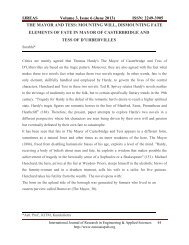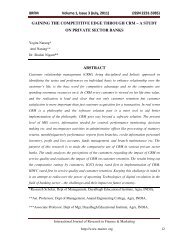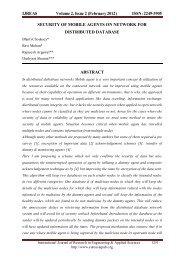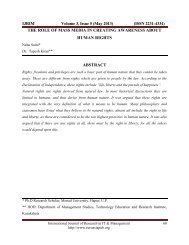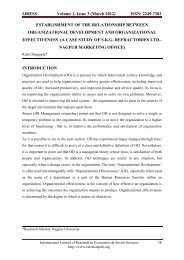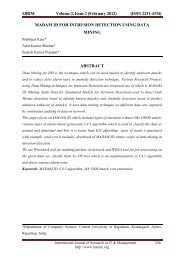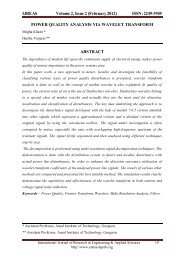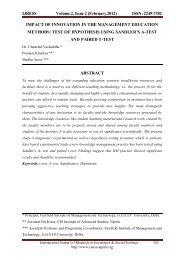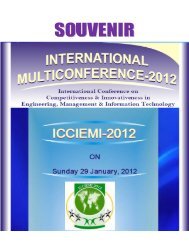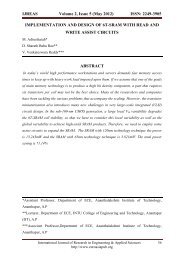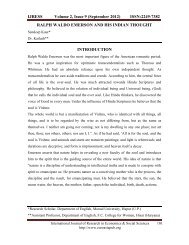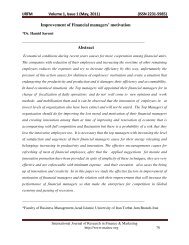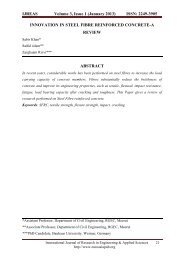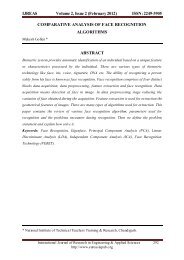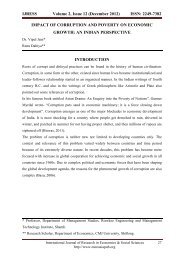A RELATIONSHIP BETWEEN ORGANISATIONAL ... - Euroasiapub.org
A RELATIONSHIP BETWEEN ORGANISATIONAL ... - Euroasiapub.org
A RELATIONSHIP BETWEEN ORGANISATIONAL ... - Euroasiapub.org
You also want an ePaper? Increase the reach of your titles
YUMPU automatically turns print PDFs into web optimized ePapers that Google loves.
IJRFM Volume 1, Issue 2 (June, 2011) (ISSN 2231-5985)<br />
them, how rewards are distributed, who is promoted, how people are treated, how the<br />
<strong>org</strong>anization responds to its environment and so on.<br />
The concept of <strong>org</strong>anization ideology was first suggested by Roger Harrison as a significant<br />
area of study enabling <strong>org</strong>anization to diagnose their cultural state and design interventions<br />
for developing a desired culture of excellence.<br />
Four <strong>org</strong>anization ideologies or culture orientation have been identified: Power, Role,<br />
Achievement/Task and Support. Although <strong>org</strong>anizations tend to have the presence of<br />
characteristics of all the four cultural orientations, based on the individual and collective<br />
paradigm, through time they develop a dominant ideology. A brief description of the<br />
characteristics of four ideologies/cultural orientations can be stated as follows<br />
• Power oriented <strong>org</strong>anizations can be compared with cob webs wherein all <strong>org</strong>anizational<br />
processes and individual energies are directed towards maintaining and strengthening the<br />
power position of a central figure which could be an individual or a group. Large<br />
<strong>org</strong>anizations tend to develop several power centers.<br />
• Role Orientated culture tends to share some of the characteristics of what is commonly<br />
called bureaucracy .The arbitrary use personal and resource based power of an<br />
individual/group is regulated by delegation of legitimate authority at various levels in the<br />
<strong>org</strong>anization .Specified role is delineated for <strong>org</strong>anization members and their responsibility<br />
and authority defined. Systems, rules and procedures are developed for judicious use of<br />
one’s authority, performance of one’s role and discharging of one’s responsibility as a<br />
result of which functional differentiations takes place often leading to compartmentalization<br />
and problems of co-ordination and controlled. The role oriented culture reinforces stability<br />
and maintenance of the system.<br />
• While Power and Role oriented cultures tend to rely more on extrinsic rewards for<br />
directing the energies and efforts of employees towards growth of the <strong>org</strong>anization, the<br />
task/achievement oriented culture focuses on intrinsic rewards for generating commitment<br />
amongst employees towards task accomplishment and <strong>org</strong>anizational excellence.<br />
Organization structure and processes are designed to facilitate task performance, which is<br />
the requirement of various tasks that determined the allocation of responsibility and<br />
distribution of authority.<br />
• The support culture is driven by the growth related needs of the individuals thereby<br />
unleashing and harnessing the human potential in meeting their expectations and<br />
International Journal of Research in Finance & Marketing 56<br />
http://www.mairec <strong>org</strong>



